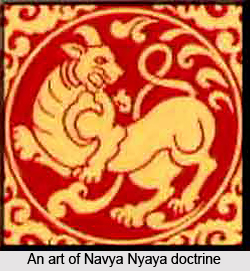 Navya Nyaya doctrine in Indian Philosophy was a development of the Nyaya darsana. The works of earlier philosophers like Vacaspati Misra and Udayana have influenced Navya-Nyaya. Till the eighteenth century it remained active. It remained active in India through to the 18th century. Tattvacintamani by Ganesa was a defence of Advaita Vedanta which offered several criticisms of Nyaya theories of thought and language. This book dealt with the important aspects of Indian philosophy which includes logic, set theory and epistemology thereby developing the Nyaya.
Navya Nyaya doctrine in Indian Philosophy was a development of the Nyaya darsana. The works of earlier philosophers like Vacaspati Misra and Udayana have influenced Navya-Nyaya. Till the eighteenth century it remained active. It remained active in India through to the 18th century. Tattvacintamani by Ganesa was a defence of Advaita Vedanta which offered several criticisms of Nyaya theories of thought and language. This book dealt with the important aspects of Indian philosophy which includes logic, set theory and epistemology thereby developing the Nyaya.
In order to analyse and solve problems in logic and epistemology Navya- Nyaya developed a sophisticated language and conceptual scheme. It systematised the concepts of Nyaya into four main categories that encompasses perception, inference, comparison and testimony.
This article is a stub. You can enrich by adding more information to it. Send your Write Up to content@indianetzone.com



















